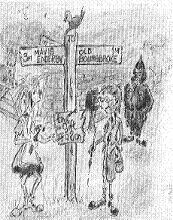On returning to Sonnet 2 yesterday, somewhat despairingly, I asked myself if I actually had anything to say or if I were merely piling up phrase upon phrase to no real purpose.
I decided to write it all out in prose, but not prosaically. I though that what I ended up with was better for being without artifice. Or more accurately for being without 'artificial artifice'; for being art hiding art.
It may also have shown up the banality of my thoughts. Can it be that prose shows up the banality of poetry, but that poetry adds beauty to the banality of prose? Maybe it can refresh the tired cliche.
Wordsworth's Daffodils is very popular, and so it should for it is delightful. Kipling's If likewise, but are they saying anything profound or original? I don't think so, but they are saying it so well. Poetry cannot always be To be or not to be, or Tomorrow and tomorrow and tomorrow, or Ode: Immortalilty, or Do not go gentle.
I'm not really sure that I'm coming to any conclusion here, except that I seem to be disagreeing with Keats and his 'Truth Beauty' idea. Maybe I should try poetic prose.
Maybe I should stop using analysis to delay action. Maybe I should just write the damn poem.
And maybe I should stop using the word 'maybe' so bloody often.

No comments:
Post a Comment